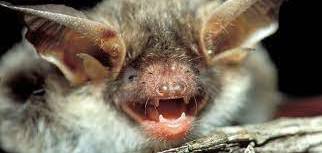
This is a question that doctors and scientists have been studying for some time. The reasons that bats transmit many diseases to humans are related to their unique way of life and how they evolved.
Bats are both more likely than other animals to have a wide variety of diseases like ebola, rabies, and coronaviruses, and more likely to pass them on to us.
Leak and é defense against disease
Bats are the only free-flying mammals, and much of their biology is about flight. Flying requires a lot of energy, so bats should favor high-quality diets. A diet of leaves, which are low in energy, would not be sufficient for most bats. They generally prefer foods high in sugar and protein such as fruits, pollen, insects, spiders, small animals and even blood.
Most of the energy of a bat is needed to power its wings and give them strength. The other parts of his body have also evolved to be very effective. The immune system is a very good example. Scientists have repeatedly shown that when a bat with a disease that would be serious or fatal to humans, it seems hardly get sick.
Where your body might have to fight hard to beat a disease, with a long and difficult process of infection, a bat's body simply tolerates it. This means that they remain healthy and able to fly and eat even when infected.
In fact, a bat's body is so good at tolerating disease that it tends to have more of them than we are. This means that even a healthy looking bat can carry several diseases.
Bats are sociable and live a long time
Most bats live in large social groups and closely interact with each other. They look after the other members of the group - the vampire bats, for example, regurgitate food for friends who have not managed to find. Bats also live longer, on average, than other mammals of similar size. Size is related to lifespan, with larger animals generally living longer and slower.
When we keep in mind that bats tolerate disease well and are also very social, it means that members of a typical bat population are likely to transmit a lot of diseases to each other - and it is unlikely that they will die from it.
This makes a typical group of bats a hotbed of disease; the risk being, of course, that this epidemic focus evolves and mutates into new forms. Because bats' immune systems protect them from disease, diseases can stay inside their bodies for months or years and have a long time to evolve. This is why bats could be important sources of new diseases, as well as the transmission of old diseases.
Flying brings bats closer to us
Bats are in the world, and there are many - more than 1200 different species. This means that we are never too far from a bat, especially since this animal can fly long distances.
In some parts of the world, you don't have to worry as long as you don't handle bats. Insectivorous bats, for example, transmit diseases to humans only through direct contact or by contaminating food with their droppings (which is still quite rare).
In other places, bats might eat the same fruit as local humans. Humans can then get diseases from the saliva of the bats. In some cases, the bats themselves are eaten by humans. Since bats can look healthy even when they are not, eating a bat is, therefore, particularly risky.
Posted on 2021-12-17 09:16








Comments